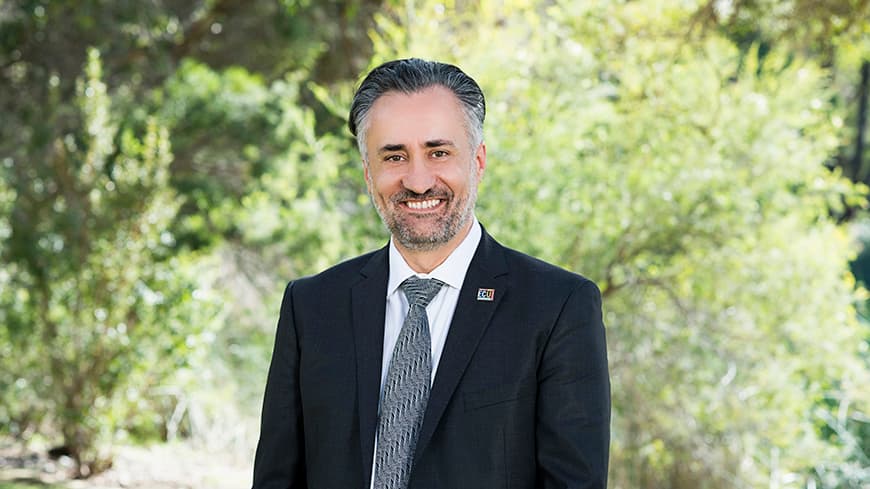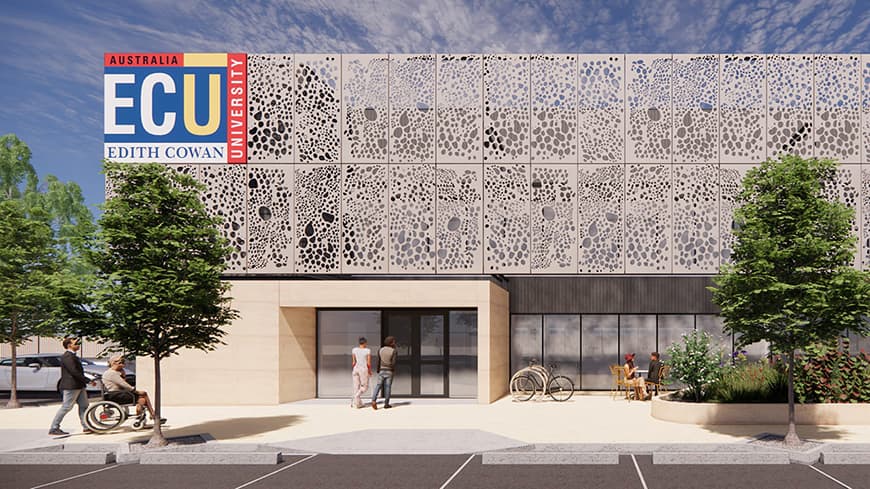Edith Cowan University (ECU) is embracing WA Mental Health Week (5-12 October) to help raise awareness of mental health as a critical component of overall health and wellbeing.
Senior Deputy Vice-Chancellor, Professor Arshad Omari said the week provided an important opportunity for the University to reach out to its community of students and staff to invite safe conversations, provide practical support and share ECU research being undertaken around mental health.
"Mental health is a critical societal issue, a workplace safety issue and a priority focus for ECU in ensuring our students and staff are supported to develop and maintain positive mental health and resilience," said Professor Omari.
"Focussing a week of activity and communications on mental health is an excellent way for us to bring awareness to mental health and wellbeing and to ensure that students and staff are really made aware of all the support services we have in place for them."
 Outgoing Senior Deputy Vice-Chancellor, Professor Arshad Omari said reaching out to its student and staff community was always priority focus for ECU.
Outgoing Senior Deputy Vice-Chancellor, Professor Arshad Omari said reaching out to its student and staff community was always priority focus for ECU.
Activities on campus create connections
Teams across ECU come together during WA Mental Health Week, along with the ECU Guild, to host fun community friendly activities that give students and staff a chance to talk openly about mental health in a supportive environment.
From pop-up workshops to morning tea picnics and informative talks at Joondalup, Mount Lawley and in the South West, ECU's support staff will be focussing on making face-to-face connections, opening the conversation around seeking help and providing practical support resources.
As ECU's support staff explain, that although modern medical science has been clear for decades on the critical impact of mental health on physical health and people’s ability to function effectively, there is still much work to be done to break the stigma and normalise of seeking help like you would for other illnesses.
Empowering and thriving
This year’s WA Mental Health Week theme: Empowering communities, thriving workforces: a journey towards investing in our mental health focusses on the role of employment and employers in mental health safety, education and recovery.
This year's theme also aims to prompt people to consider how looking after their mental health, and being considerate of their colleagues' needs too, is something we all need to build into our career planning and work and study practices.
Wellbeing at ECU
ECU commitment to supporting mental health awareness, stated in its Mental Health Strategy 2021-2024, has been leading a progressive university-wide approach to mental health and wellbeing.
ECU is proudly recognised as a Mental Health First Aid Gold Skilled Workplace, where Mental Health First Aid Training is available and encouraged for staff.
Professor Omari explains that nurturing a holistic wellbeing culture with its recently launched Wellbeing Framework, is enabling and supporting the ECU community to thrive, flourish and achieve their full potential.
"We are proud of the positive, supportive and inclusive culture we've we developed at ECU, it is something our staff and students often comment on, that sense of being safe and supported and belonging in a community," said Professor Omari.
"ECU recognises its overall success relies on the contributions and performance of all its staff and students."
ECU's Work Health and Safety (WHS) Team have engaged Headspace, Medibank and our employee assistance provider PeopleSense to present sessions throughout Safe Work Month and Mental Health Week that focus on how to have safe respectful conversation with staff about mental health and delving into the mental health impacts of menopause and (celebrating World Menopause Day).
The Employee Assistance Program (EAP) at ECU is a core support structure there to provide staff and their immediate family with access to free and confidential short-term psychological assistance for either personal or work-related issues.
Students are supported to fulfill their dreams
WA Mental Health Week is an opportunity for ECU to remind its community of students and staff to reach out to the support services available, of which there are many.
Professor Omari explained it was normal part of university to feel a little overwhelmed, especially as a new student.
"Being a student, with all your hopes and dreams and for many those of their families too, can make the time a very stressful one. Staying healthy is a really important part of study and we take student health seriously at ECU, so we offer a range of services for anyone who needs them."
Students are supported to maintain positivity and develop resilience with free confidential psychological support through a range of services, including free a confidential counselling service and crisis support, workshops, tip sheets, and new initiatives like The Wellbeing Precinct where you will find The Living Room, ECU Health Service and Psychological Counselling Support.
 The Living Room is a quiet and calming space where you drop in to have a relaxed chat with a trained peer who understands your student journey.
The Living Room is a quiet and calming space where you drop in to have a relaxed chat with a trained peer who understands your student journey.
The ECU Health Services are here for your health care needs
The ECU Health Centres at Wanneroo and Yanchep are integrated primary healthcare facilities offering a 'one-stop shop' for patients and families. The ECU Health Centres provide a range of multidisciplinary health services and programs to build the health and wellbeing of the Yanchep and Wanneroo communities. The Centres incorporate clinical training and research, helping support the development of the future health workforce.
The ECU Health Services are also located at Joondalup and Mount Lawley campuses to assist students, staff and the university community with their health care needs. The primary function of the service is to provide you with psychosocial and physical health support, so that you may achieve an optimal academic performance in the shortest possible time.
 New ECU Health Centre Yanchep, which suburbs are one of the fastest-growing urban corridors in WA
New ECU Health Centre Yanchep, which suburbs are one of the fastest-growing urban corridors in WA
Reflecting on the size of the issue
The Australian Bureau of Statistics(ABS) latest release of the National Study of Mental Health and Wellbeing showed that it is closer to half the population of Australia that experience a mental disorder at some time in their life:
- 42.9% of people (aged 16–85 yrs) had experienced a mental disorder at some time in their life
- 21.5% of people had a 12-month mental disorder, with Anxiety being the most common group (17.2% of people aged 16–85 years)
- 38.8% of people aged 16–24 years had a 12-month mental disorder
ABS latest release of the National Study of Mental Health and Wellbeing 5/10/2023
As a member of the public you can reach out too
If anyone out in the community not connected to ECU is experiencing distress here are some resources you can reach out to - 24 hours, 7 days a week.
Lifeline: 13 11 14
Suicide Call Back Service: 1300 659 467
Beyond Blue: 1300 224 636
MensLine Australia: 1300 789 978
Kids Helpline: 1800 551 800
13YARN: 13 92 76
For further information see Mental health resources

 ECU supports WA Mental Health Week to help break the stigma and normalise seeking help.
ECU supports WA Mental Health Week to help break the stigma and normalise seeking help.



